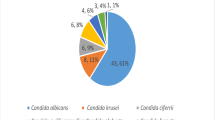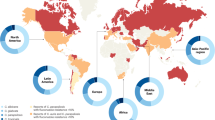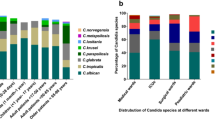Abstract
Data sources Medline and EMbase and the Cochrane Library to April 2000.
Study selection Articles were only included if they were written in English and the study was performed in humans. A scoring system for quality was used and evidence was graded as good, fair, poor or insufficient. Studies that had no control or comparison group were excluded, as were studies of non-HIV/AIDS populations. Studies reporting mixed-site candidiasis were also excluded if oropharyngeal candidiasis was not reported separately.
Data extraction and synthesis Study design, sampling, study group characteristics, interventions and reported outcomes were extracted.
Results For prevention, six trials met inclusion criteria but there was insufficient evidence to draw conclusions about nystatin, clotrimazole, amphotericin B suspension, ketaconazole or itraconazole. One study demonstrated that nystatin pastilles (at 200 000 and 400 000 IU/day) was effective in the prevention of new or recurrent oropharyngeal candidiasis. There is good evidence, however, that fluconazole is also effective (doses were 50–1000 and 150–200 mg/day). Nausea is a common side effect of fluconazole, but this was reported to be tolerable.
For treatment, 12 trials were included. None addressed the efficacy of amphotericin B suspension. Evidence for the effectiveness of the other antifungal agents was good: fluconazole, ketaconazole and itraconazole showed similar efficacy and were more effective than clotrimoxazole or nystatin, particularly when mycological and relapse rates were considered. Mild adverse events, mainly gastrointestinal problems, rarely resulted in discontinuation of treatment.
Conclusions There is evidence that antifungal drugs are effective in the prevention and treatment of oropharyngeal candidiasis in HIV-infected people. The need remains, however, to improve the evidence base. Larger, better-defined studies are required to address issues such as immunological status, viral load, history of previous candidiasis, past exposure to antifungals, drug interactions and antiretroviral therapy. Studies should also include compliance-monitoring, fungal speciation and susceptibility testing.
Similar content being viewed by others
Log in or create a free account to read this content
Gain free access to this article, as well as selected content from this journal and more on nature.com
or
Author information
Authors and Affiliations
Additional information
Address for correspondence: Lauren Patton, Department of Dental Ecology, CB7450, School of Dentistry, University of North Carolina, Chapel Hill, NC 27599-7450, USA. E-mail: Lauren_Patton@dentistry.unc.edu
Patton LL, Bonito AJ, Shugars DA. A systematic review of the effectiveness of antifungal drugs for the prevention and treatment of oropharyngeal candidiasis in HIV-positive patients. Oral Surg Oral Med Oral Pathol 2001; 92:170–179
Rights and permissions
About this article
Cite this article
Porter, S. Good evidence to support efficacy of antifungals for Candida treatment in HIV infection. Evid Based Dent 4, 14 (2003). https://doi.org/10.1038/sj.ebd.6400158
Published:
Issue date:
DOI: https://doi.org/10.1038/sj.ebd.6400158



